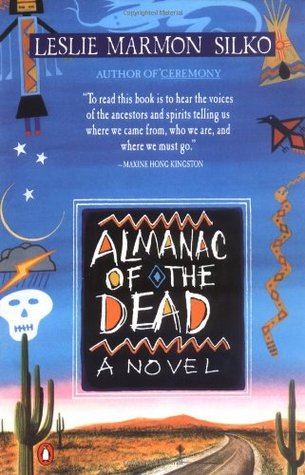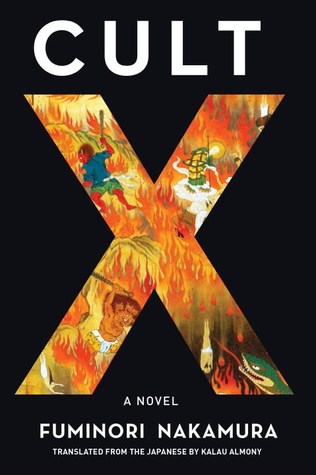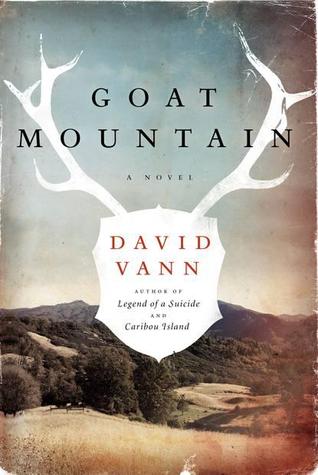Most authors want their readers to feel safe enough to turn the next page.
But for some authors, ‘safe’ just won’t do. There are a few brave authors who write books where you will feel more assaulted than nurtured. Books where the view of humanity is bleak, and where the characters don’t care what you think of them.
It’s amazing how often I end up really hating this kind of book and everything about it, only to turn around days or sometimes years later and realize I have never stopped thinking about them. Reading these books was a transformative experience. They changed my mind and my heart. There are probably gentler ways to wrest readers out of their complacent ways of thinking but just now it feels like authors must make a choice–they must either support a reader’s current ways of thinking, or the must risk losing readers in order to shake them out of their complacency.
Here are some books that shook me. I recommend them all. But maybe not all at once.
ALMANAC FOR THE DEAD by Leslie Marmon Silko
This novel is exorbitantly, lavishly violent. It’s a sordid kind of violence, violence done to and by characters with a pathological level of cruelty. It was impossible to not feel assaulted by it as I read. It jolts me right out of my complacency about the past. This is a novel about Native American genocide, about American genocide. It’s about a holocaust that has been more or less lost to history in terms of its overwhelming magnitude, and where what is remembered has been kitsched over and transformed into popular entertainment. Silko set out to shatter the past as it has been preserved in our collective culture and to replace it with something far more damning and sad.
Much of the writing is staccato, scattered, shattered, and at times nearly incoherent. Silko tells a story of lives brutalized. It’s a story where proper sentences would prettify and thus lie. The stylistic punches built up a level of dread in me as I read. There are scenes of such brutality and lack of humanity that they left me sick. I also frequently felt lost, and irritated by a prose style that felt deliberately blunted and ugly. ANd then I would think: this is right, this is the right way to tell such an ugly history.
Now and then would come chapters of soaring lyricism, interstitially spaced between the chapters of violence and cruelty. They fortified me. They allowed me to keep reading.
It’s maybe my highest praise of a book when I can honestly say “I’ve never read anything like this book before.” And I admire how ruthless Silko is, even though there are passages I wish I could un-read.
CULT-X by Fujinori Nakamura
This is a story where human agency is helpless before the crushing weight of history and propaganda. The entire notion of free will is revealed as a sham. I was repulsed by the ugliness of this novel, and by the sexual violence, and by the passivity of the female characters, and by the hopelessness of the story itself. Some scenes read like infantile sadistic male fantasies. I kept trying to frame these scenes in a literary light. I kept trying to believe these scenes had literary value beyond their face value. I couldn’t do it. I couldn’t find a scrap of redemptive value in them.
And then I read John Nathan’s review of The Rise and Fall of Modern Japanese Literature by John Whittier Treat, published in the August 16 2018 New York Review of Books. Even though Nathan never mentions Cult-X, Nathan does mention other popular Japanese novels, some of which are still to be translated, and all of which seem as disturbing as Cult-X, or even more so. Nathan’s essay reminded me that Japanese writers are working from inside the horror of their recent history: the madness of unquestioned nationalism, the razing of whole cities by firebombs, the horror of two nuclear attacks, the death tolls from earthquake and tsunami; and then add to these the way any hope for the future has been crushed by the crash of a bubble economy, the rapid aging of the population, and an economy that continues to stagnate and to offer little opportunity for the next generation. Reminded of these things, I discovered that my first reaction to this novel, to reject its nihilism, began to feel like a privileged person’s naive understandings. I could see this novel anew. It’s still not a fun read, but it is a thought-provoking one.
Goat Mountain by David Vann
Goat Mountain by David Vann is the second most ruthless book I’ve ever read. Number 1 in the most-ruthless category is Dirt by David Vann. Numbers 3,4, and 5 on my ruthless books list would also be novels by David Vann.
There is no other author who is so skilled at combining poetry with viscera. The combination is Homeric. It commands your attention. Vann’s novels remind you that life-and-death stories are actually, literally about life and death. Each of Vann’s novels invokes the heightened tension of the best genre thriller, but goes so far beyond that genre-level dread, because the stakes in these books are real, and they are enormous. Vann books make me gasp with their audacity. In my head as I read Vann’s books I hear these questions: Is he really going to write that? And: Did he really write that? and with each of his novels I feel the same wrenching understanding, as I read, that I’m going to be brought to a level of primal violence, a level that I hadn’t been able to imagine being inscribed in language before then.
Goat Mountain is my favorite of Vann’s books because the story is so fundamental and pure. There is absolutely nothing extraneous in its pages. It’s like the last few seconds of a Greek play, in novel form. It’s Oedipus gouging his eyes out. It’s Agamemnon cutting his own daughter’s throat.
It does not surprise me at all that Vann’s latest book, Bright Air Black, is a retelling of the Medea myth. It is a lovely visceral rendition that you should also read, both for its fierce feminism and for the unbeatable scene of Medea scraping her brother’s putrid remains off the deck of Jason’s ship with a wooden spoon.
And it also does not surprise me that in the acknowledgments of Bright Air Black Vann writes “my novels are all Greek tragedies.”
For me it is in Goat Mountain where Vann’s love of Greek tragedy is displayed at its primal and perfect best.



